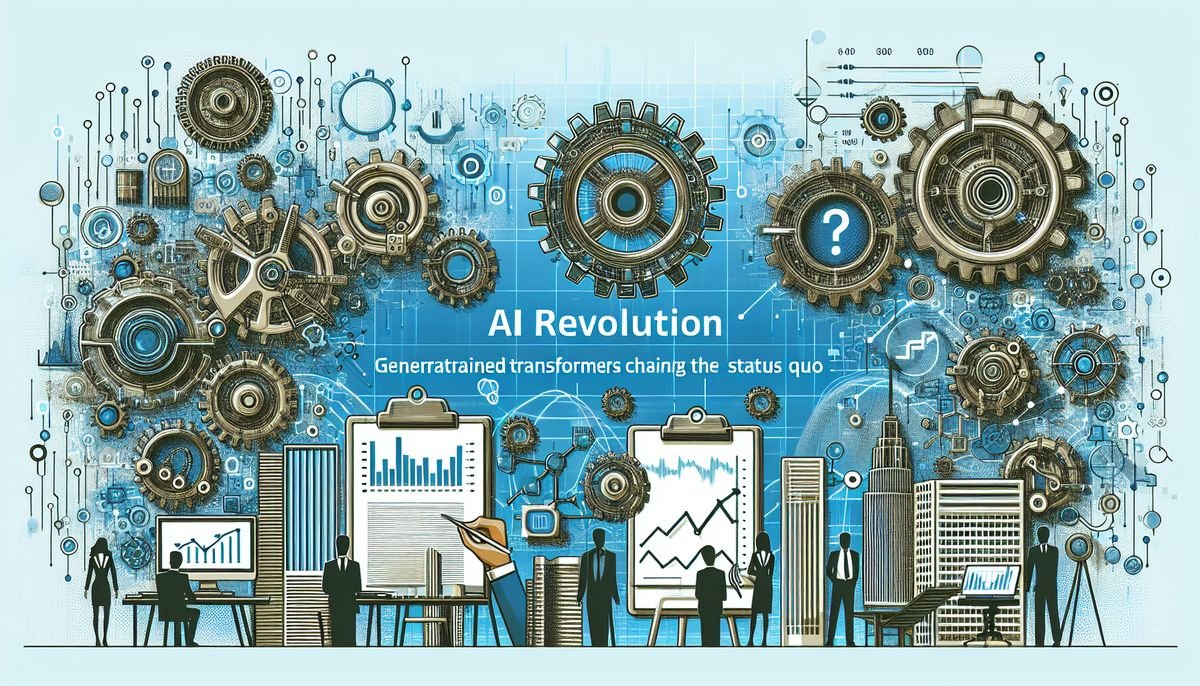The advent of Generative Pretrained Transformers (GPT) represents a seismic shift in the business world, particularly in the B2B sector. These advanced AI models, such as GPT-3, are not just enhancing current processes but are carving out entirely new avenues for innovation and efficiency. This article delves into the transformative impact of generative AI on B2B product discovery and sales, and customer service operations, offering insights into how businesses can harness this technology to stay ahead in a rapidly evolving landscape.
Key Takeaways
- Generative AI, particularly GPT-3, is significantly enhancing B2B product discovery by offering sophisticated search capabilities and highly personalized recommendations.
- The implementation of GPT-3 in B2B sales and customer service is automating operations, improving efficiency, and providing personalized customer experiences that align with 2023 trends.
- While the potential for AI to transform data management is high, the success of such applications hinges on the quality and cleanliness of the underlying data.
The Impact of Generative AI on B2B Product Discovery
Enhancing Search Capabilities and Personalization
The advent of generative AI has revolutionized the way businesses approach product discovery and search capabilities. With the integration of dynamic few-shot prompting, AI can now provide highly relevant suggestions tailored to the specific queries of users. This not only enhances the search experience but also aids in product discovery, guiding customers towards items they may desire but have not explicitly searched for.
In the realm of B2B, personalization has become a cornerstone of digital transformation. It’s not just about responding to direct searches; it’s about predicting and shaping customer preferences. AI’s predictive capabilities are pivotal in this, allowing businesses to anticipate market demands and tailor experiences to individual customer behaviors and needs.
The selective prediction and personalization capabilities of AI are transforming the B2B landscape, making it possible to create more engaging and customer-centric digital environments.
The table below illustrates the shift from traditional to digital-first B2B sales, highlighting the role of AI in enhancing efficiency and personalization:
| Aspect | Traditional B2B Sales | Digital-First B2B Sales |
|---|---|---|
| Interaction | Face-to-face | GPT-enhanced digital engagement |
| Customer Expectations | Product-focused | Experience-driven |
| Sales Approach | Relationship-based | Data and AI-driven |
| Efficiency | Variable | Accelerated by GPT applications |
As we continue to navigate the AI revolution, it’s clear that generative pretrained transformers are not just changing the business landscape—they’re setting a new standard for how businesses interact with and understand their customers.
Predicting Customer Preferences with GPT-3
The integration of GPT-3 into B2B ecosystems is not just about enhancing existing processes; it’s about anticipating and shaping future customer preferences. Businesses are leveraging GPT-3’s advanced predictive capabilities to forecast market trends and tailor their offerings accordingly. This proactive approach is particularly evident in the realm of ecommerce, where personalization is key.
- Generative AI Ecommerce: Incorporating it into your strategy is crucial for staying ahead. This type of AI can revolutionize how ecommerce businesses create content, optimize product design, and personalize customer interactions.
The predictive power of GPT-3 is transforming how businesses understand and cater to their customers, making it an indispensable tool for those looking to gain a competitive edge.
As we continue to witness the rise of GPT-3 in the B2B sector, companies are adopting strategies to harness its potential for growth prediction and customer personalization. The table below showcases the recent surge in interest for GPT-3 applications within the B2B space:
| Application Area | Number of Mentions |
|---|---|
| Content Creation | 1,113 |
| Product Design | 2,929 |
| Customer Interaction | 83 |
Navigating the Challenges of Data Management
The integration of Generative Pretrained Transformers (GPT-3) into B2B data management has been a transformative trend. However, the effectiveness of these AI models is highly dependent on the quality of the underlying data. As businesses strive to harness the power of GPT-3, they encounter the critical need for data hygiene to ensure the integrity and utility of their datasets.
One of the trending topics in the past three months has been the focus on zero-party data. This type of data is provided directly by customers, offering a goldmine of insights while also presenting new challenges in terms of collection, storage, and usage within AI frameworks.
The promise of AI-assisted data management strategies is potent, yet contingent on the integrity of the data it is fed.
To address these challenges, businesses are adopting a multi-faceted approach:
- Prioritize Data Hygiene
- Leverage Zero-Party Data
- Apply AI Cautiously
These steps are crucial for B2B ecommerce platforms that aim to provide personalized experiences without compromising on data security or compliance.
AI-Driven Transformation in B2B Sales and Customer Service
Automating Operations and Improving Efficiency
In the realm of B2B sales, the integration of Generative Pretrained Transformers (GPT) has been a game-changer for operational efficiency. Businesses are now leveraging AI to reduce redundancy and focus on feature sets that truly matter. This shift towards digital-first sales strategies is characterized by process automation and error mitigation, leading to a significant reduction in manual oversight and labor costs.
The recent trend of Composable Commerce highlights the benefits of GPT integration in B2B sales. It allows for:
- Flexible modules for variable data needs
- Automated data analysis and predictive modeling
- Tailored user experiences without backend complexities
The key to success in this evolving landscape is the strategic investment in necessary components, ensuring cost-effectiveness while enhancing customer interaction and market adaptability.
As we adapt to the 2023 trends in generative AI, it’s crucial to recognize the accelerated efficiency brought about by GPT applications. The transition from traditional, relationship-based sales approaches to data and AI-driven strategies is not just about keeping up with technology—it’s about redefining the customer experience and setting new standards in operational excellence.
Personalized Customer Experiences through AI
In the dynamic sphere of B2B interactions, Generative AI is making it possible for customer experiences to be more personalized than ever before. The integration of AI into customer service platforms allows for a nuanced understanding of customer behaviors and preferences, leading to highly tailored interactions. For instance, AI-driven behavioral segmentation enables targeted marketing that resonates with specific customer profiles, enhancing both engagement and loyalty.
The predictive capabilities of AI are not just about understanding current trends but also about anticipating future needs. This foresight is crucial in delivering hyper-personalized experiences that not only meet but exceed customer expectations. AI tools are instrumental in this process, offering:
- Personalized recommendations based on past interactions
- Sentiment analysis to gauge customer satisfaction
- Customized marketing materials that align with individual consumer profiles
The role of AI in personalizing customer experiences is a testament to its transformative power in the B2B sector. It’s a trend that has gained significant traction in recent months, with businesses increasingly recognizing the value of AI in crafting bespoke customer journeys.
As we adapt to the 2023 trends in generative AI, it’s clear that the technology’s role in personalizing customer experiences is not just a passing fad but a cornerstone of modern B2B strategies. The table below illustrates the uptrend of personalized marketing in B2B, where AI is no longer a mere novelty but a fundamental driver for creating tailored customer experiences.
| Year | Adoption Rate (%) | Notable Trends |
|---|---|---|
| 2021 | 45 | Initial AI integration in marketing |
| 2022 | 65 | Rise of behavioral segmentation |
| 2023 | 85 | Dominance of hyper-personalization |
This data underscores the growing importance of AI in delivering customer experiences that are not only efficient but also deeply resonant on a personal level.
Adapting to the 2023 Trends in Generative AI
As businesses continue to integrate Generative Pretrained Transformers (GPT) into their operations, the 2023 trends in generative AI are becoming increasingly pivotal. One of the most significant trends is the adoption of GPT for enhancing B2B services, which has seen a remarkable uptick in the past few months. This trend is not only about improving efficiency but also about redefining customer interactions and service delivery.
The table below showcases the impact of generative AI across different business functions compared to the previous year:
| Function | 2023 Outlook | 2023 vs 2022 Impact |
|---|---|---|
| Product Discovery | Highly positive; increased accuracy | Significant growth; improved by 40% |
| Data Management | Positive; contingent on data cleanliness | Moderate growth; improvement by 25% |
| Sales and Customer Service | Transformative; new agile processes | Substantial shift; 50% teams adopting AI tools |
The promise and challenge of Generative AI is now central to business innovation, with a focus on agility and personalized experiences.
As we delve into the specifics, it’s clear that generative AI is facilitating a wider spectrum of applications beyond traditional search and data management. The ability to predict customer preferences and automate operations is transforming B2B sales and customer service, leading to agile processes that were not possible before.
Conclusion
As we stand on the brink of a new era in business innovation, the transformative power of Generative Pretrained Transformers (GPT-3) in the B2B landscape is undeniable. The insights and discussions presented in this article underscore the profound impact that GPT-3 and Generative AI are having on product discovery, data management, and customer service. With the potential to enhance accuracy, efficiency, and personalization, these technologies are not just trends but are becoming integral components of a competitive business strategy. However, the journey towards full integration is not without its challenges, including the need for clean data and the adaptation of existing workflows. Businesses that are willing to navigate these challenges and harness the capabilities of GPT-3 will likely find themselves at the forefront of their industries, reaping the benefits of this AI revolution. As we continue to witness the growth and application of AI in B2B services, it is clear that the future of business will be increasingly data-driven, personalized, and innovative.
Frequently Asked Questions
What are the emerging trends for GPT in B2B services for 2023?
In 2023, the integration of Generative Pre-trained Transformers (GPT-3) into B2B services is trending. Businesses are enhancing product discovery, automating data management, and improving customer service with AI-powered applications. The trend reflects a broader movement towards leveraging AI to streamline operations and create personalized customer experiences.
How is Generative AI transforming B2B product discovery?
Generative AI, especially GPT-3, is transforming B2B product discovery by enabling more advanced search capabilities and personalized recommendations. This leads to faster and more efficient discovery processes that cater to the specific needs and preferences of B2B buyers, resulting in a more streamlined and enriched product search experience.
What are the challenges of implementing GPT in B2B data management?
Implementing GPT in B2B data management presents challenges such as the necessity for clean and high-quality data. While Generative AI offers the potential to manage and analyze large datasets effectively, its success is highly dependent on the integrity and cleanliness of the data provided. Overcoming this hurdle is crucial for businesses to fully leverage AI in data management strategies.



